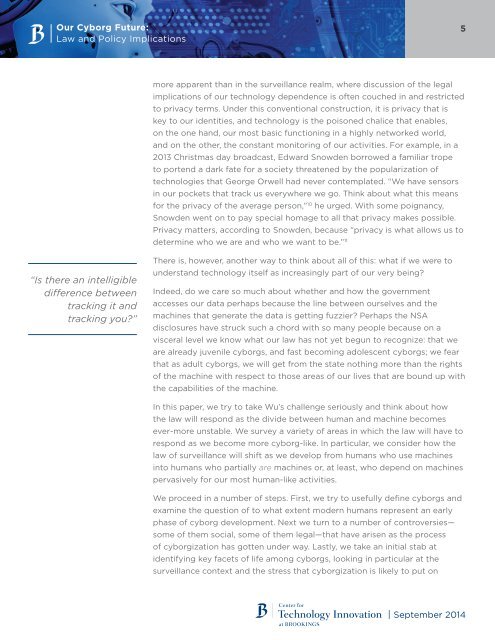cyborg_future_law_policy_implications_FINAL2
cyborg_future_law_policy_implications_FINAL2
cyborg_future_law_policy_implications_FINAL2
You also want an ePaper? Increase the reach of your titles
YUMPU automatically turns print PDFs into web optimized ePapers that Google loves.
Our Cyborg Future:Law and Policy Implications5more apparent than in the surveillance realm, where discussion of the legal<strong>implications</strong> of our technology dependence is often couched in and restrictedto privacy terms. Under this conventional construction, it is privacy that iskey to our identities, and technology is the poisoned chalice that enables,on the one hand, our most basic functioning in a highly networked world,and on the other, the constant monitoring of our activities. For example, in a2013 Christmas day broadcast, Edward Snowden borrowed a familiar tropeto portend a dark fate for a society threatened by the popularization oftechnologies that George Orwell had never contemplated. “We have sensorsin our pockets that track us everywhere we go. Think about what this meansfor the privacy of the average person,” 10 he urged. With some poignancy,Snowden went on to pay special homage to all that privacy makes possible.Privacy matters, according to Snowden, because “privacy is what allows us todetermine who we are and who we want to be.” 11“Is there an intelligibledifference betweentracking it andtracking you?”There is, however, another way to think about all of this: what if we were tounderstand technology itself as increasingly part of our very being?Indeed, do we care so much about whether and how the governmentaccesses our data perhaps because the line between ourselves and themachines that generate the data is getting fuzzier? Perhaps the NSAdisclosures have struck such a chord with so many people because on avisceral level we know what our <strong>law</strong> has not yet begun to recognize: that weare already juvenile <strong>cyborg</strong>s, and fast becoming adolescent <strong>cyborg</strong>s; we fearthat as adult <strong>cyborg</strong>s, we will get from the state nothing more than the rightsof the machine with respect to those areas of our lives that are bound up withthe capabilities of the machine.In this paper, we try to take Wu’s challenge seriously and think about howthe <strong>law</strong> will respond as the divide between human and machine becomesever-more unstable. We survey a variety of areas in which the <strong>law</strong> will have torespond as we become more <strong>cyborg</strong>-like. In particular, we consider how the<strong>law</strong> of surveillance will shift as we develop from humans who use machinesinto humans who partially are machines or, at least, who depend on machinespervasively for our most human-like activities.We proceed in a number of steps. First, we try to usefully define <strong>cyborg</strong>s andexamine the question of to what extent modern humans represent an earlyphase of <strong>cyborg</strong> development. Next we turn to a number of controversies—some of them social, some of them legal—that have arisen as the processof <strong>cyborg</strong>ization has gotten under way. Lastly, we take an initial stab atidentifying key facets of life among <strong>cyborg</strong>s, looking in particular at thesurveillance context and the stress that <strong>cyborg</strong>ization is likely to put on| September 2014


